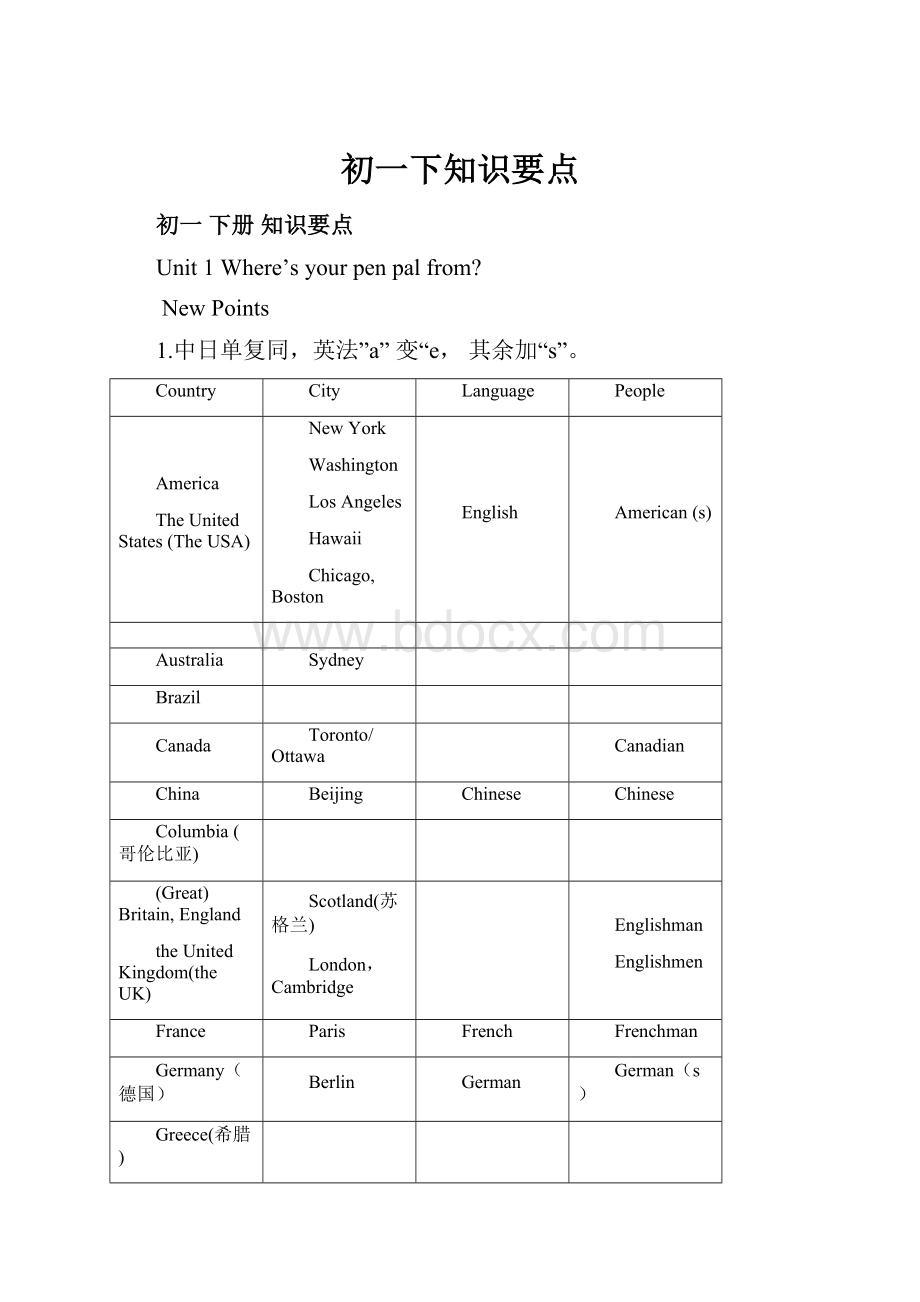初一下知识要点.docx
《初一下知识要点.docx》由会员分享,可在线阅读,更多相关《初一下知识要点.docx(50页珍藏版)》请在冰豆网上搜索。

初一下知识要点
初一下册知识要点
Unit1Where’syourpenpalfrom?
NewPoints
1.中日单复同,英法”a”变“e,其余加“s”。
Country
City
Language
People
America
TheUnitedStates(TheUSA)
NewYork
Washington
LosAngeles
Hawaii
Chicago,Boston
English
American(s)
Australia
Sydney
Brazil
Canada
Toronto/Ottawa
Canadian
China
Beijing
Chinese
Chinese
Columbia(哥伦比亚)
(Great)Britain,England
theUnitedKingdom(theUK)
Scotland(苏格兰)
London,Cambridge
Englishman
Englishmen
France
Paris
French
Frenchman
Germany(德国)
Berlin
German
German(s)
Greece(希腊)
Holland(荷兰)
Iceland(冰岛)
India(印度)
Italy(意大利)
Rome(罗马)
Japan
Tokyo
Japanese
Japanese
(South)Korea(韩国)
Seoul(汉城)
Korean
Korean
Mexico(墨西哥)
Mongolia(蒙古)
Norway(挪威)
Peru(秘鲁)
Poland(波兰)
Russia(俄罗斯)
Singapore
Spain(西班牙)
Spanish
SouthAfrica(南非)
Sweden(瑞典)
Switzerland(瑞士)
Thailand(泰国)
Bangkok(曼谷)
Asia–AsianAfrica-African
Europe-EuropeanAmerica--American
Oceania(大洋洲)
ThePacific太平洋TheAtlantic大西洋
IndiaOcean
※2.befrom/comefrom"来自……”可问人或物,comefrom还可问出身
Where’syourpenpalfrom?
=Wheredoesyourpenpalcomefrom?
He’sfromAustralia.
=HecomesfromAustralia.
DoeshecomefromPairs?
=IshefromPairs?
3.Wheredoeshelive?
HelivesinTokyo.
1)对地点提问用“where”
WhereisSydney?
2)※live(vi.)+in/at+s.p.
+adv.(here/there)
(联想:
comehere,gothere,gethome)
liveonsth.
livewithsb.
3)Wheredoeshelivein?
×
Wheredoeshelive?
√
Which(place)doeshelivein?
√
(提问时where代替是整个介词短语)
4.带宾语从句的主从复合句
(Ithink)(Chinaisaveryinterestingcountry.)
主谓宾:
主谓
主句宾语从句
※5.1)alittle(少量的,肯定含义)
little(少到几乎没有,否定含义)
只可修饰(u)n.
2)afew(少数几个,肯定含义)
few(少到几乎没有,否定含义)
只可修饰(c)n.
(联想:
many,anumberof,much,alotof,lotsof,some,any…)
alittle还修饰adj./adv.
6.writetosb.=writealettertosb.=writesb.aletter
writebacktosb.
writeaboutsth./sb.(yourself)
7.Whatlanguagecan/doeshespeak?
language©n.
French,Spanish….(u)n
(whichlanguage...)
8.Japaneseforkids
9.Frenchfortoday
10.OurworldinEnglish
11.penpal=penfriend
12.intheworld
around/allovertheworld
amapoftheworld/China
※13.like-dislike
1)n.
2)v.+todosth./doingsth./sth.
3)prep.
looklike,belike
doitlikethat
14.interestn.
v.
interested
beinterestedin(doing)sth.
interesting
15.eight-year-old复合形容词:
eightyearsold
※Review(见上期知识要点)
1.speak,tell,say,talk
speakEnglish
sayitinEnglish
tellsb.aboutsth./(not)todosth.
2.in,on,at表“在(时间)”的“在”
onweekends
MybirthdayisinNovember.
3.and,with的区别、
MymotherandfathergotoGuangdong.
MymotherwithfathergoestoGuangdong.
4.and,but,or,so的区别
5.too,also,either三“也”(aswell)
6.What’sTomKing’sfavoritesports/subject/movie/…?
favorite与like…best
7.look,lookat,havealook(at),see,read
8.gotothemovies=gotoamovie=seeafilm
9.playsports
play
10.want,wouldlike,feellike
11.祈使句与其否定句
12.be
13.一般现在时态
14.at/school/home
15.面对表扬应说“Thankyou.”
16.IthinkChinaisaveryinterestingcountry.
主句宾语从句
Unit2Where’sthepostoffice?
NewPoints
1.※Therebe句型
There+be+sb./sth.+某地、某时.
引导词,谓语主语状语,可前置
无义也可无
含义:
表示“在”某个时间或地点“存在有”,强调一种客观存在。
1)与have之别:
have表示某人“拥有”的所有权关系,或物体本身的一部分。
(关键在“在……”)
Inmyroomtherearenowindows.
=Myroomhasnowindows.
Hehasacar.
Thereisacaroverthere.
2)就近原则:
therebe的be用is还是are,遵循就近原则---由be后最近的名词决定。
比较:
There_____apenandafewbooksonthedesk.
There____afewbooksandapenonthedesk.
Apenandafewbooks_____onthedesk
Afewbooksandapen____onthedesk
3)各句型
肯:
Therebe(is/are)+n.(sb./sth.)+某地+某时.
(“有”字放前边,有“啥”放中间,“地点、时间”放后面,“地点”放在“时间”前。
)
否:
Therebe+not+…
be后加not,some变any,and变or.
一般问句:
Is/Arethere…?
be提前,some变any.
(Yes,thereis/are.No,thereisn’t/aren’t.)
特殊疑问句:
A.Thereissomebooks,afewpensandadictionary.
What’s+地点?
(问therebe后的主语,对主语提问,仍用陈述语序,并视为三单主语。
B.Thereissomeorangeintheglass.
Whereisthereanyorange?
C.ThereisaclassmeetingonWednesday.
Whenisthereaclassmeeting?
D.Thereare32boysinourclass.
Howmanyboysarethereinourclass?
E.Thereisnobread.
Howmuchbreadisthere?
2.※问路,指路
1)Excuseme
2)Istherea+n.?
Whereisthe(nearest)+n.?
=Whichisthewaytothe+n.?
HowcanIgettothe+n.?
Couldyoutellmethewaytothe+n.?
CouldyoutellmehowIcangettothe…?
Couldyoutellmehowtogetto..?
3)—I’msorry,Idon’tknow.I’mnewhere.---Thankyouallthesame.
4)Sorry,Idon’tknow.(I’mnewhere.Pleaseask…
5)Yes,thereis.
6)It’snotfar.Youcanwalk.
7)You’dbettertakethebus.
(hadbetter+notV原)
8)Justgostraight.
9)It’sdown…Streetontheright/left.
10)Godown/up/along…
11)Turnleftatthefirstturning/crossing.
=Takethefirstturning/crossingontheleft.
12)Youcanpass(thebank)……
13)gothrough….
14)It’son..Avenue.
15)It’snextto…
3.※nextto
4.※nearhere=intheneighborhood
=aroundhere
5.※infrontof
inthefrontof
behind
after,before强调顺序或时间的前后
6.※between…and…
from…to…
7.※acrossfrom
8.※across,through,cross
词性,含义
1)acrossprep.
2)throughprep.
3)crossv.
walk/go/runacross=cross…
9.※enjoy+sth./sb./doingsth./oneself
10.takeawalk=takewalks
goforawalk/gooutforawalk
take…forawalk
11.※havefun(in)doingsth.
havefun=enjoyoneself
=haveagood(nice/great/wonderful)time
12.haveagoodtrip
13.※hopetodosth./+宾从
hopeforsth.
hopeso/not
(wishsb.todosth.√)
(hopesb.todosth.×)
14.takeataxi/bus(fromtheairport)
(=leavefromtheairportbytaxi/bus)
15.passabank
passv
n.
16.※onthe/one’sway+ton./adv.
onthe
17.※asmallhouse(withaninterestinggarden)
with短语作后置定语,表示带有…….的特征
18.agoodplace※(tohavefun)
动词不定式作后置定语
19.※right
1)“对的、正确的”
It’sright./You’reright./That’sright.表示赞同对方的意见、看法或行为。
2)“Allright.”=OK“行,可以”,同意对方的建议或要求
3)右边
left
turnright=turntotheright.
ontheright/onone’sright
4)权利
5)恰好、正好
20.straight
21.bank
※22.payback
Sb.pay(sb.)(somemoney)forsth.
Sb.spendsometime/moneyonsth.
(in)doingsth.
Sth.cost(sb.)somemoney.
Ittakes(sb.)sometimetodosth.
23.open—close/closed
24.welcometo…
You’rewelcome.
25※.begin=start+sth./todosth./doingsth.
n.beginning
atthebeginningof…
26.clean-dirty,young-old,quiet-noisy/busy(outgoing),free-busy,big/large-small,hard/difficult-easy,interesting-boring,good-bad,long–short
27.宾语从句
Tellyourpartneraboutwhereyoulive.
Drawapictureofwhereyoulive.
※28.“主将从现”
Ifyou’rehungry,youcanbuysomefoodinthesupermarket.
If“如果”引导条件状语从句,当主句为将来时态或用情态动词或为祈使句时,if句用一般现在时态表示将来时态。
时间状语同理
※29.倒装句型
Acrossfromtheparkisanoldhotel.
Nexttothehotelisasmallhousewithaninterestinggarden.
介词短语或副词(here/there)提前到句首,且主语为名词时,要倒装即谓语动词提到主语前。
注意:
主语为代词不倒装。
Hereishiscat./Hereismyroom.
Hereyouare./Hereitis.
Review:
1.tellyouthewaytomyhome
tellsb.sth./sb.aboutsth./(not)todosth.
2.buysb.sth.=buysth.forsb.
3.in,on之别
4.on=about“关于”
5.inEnglish
6.under,over
7.※get,arrive,reach三“到达”
8.bebusywithsth./doingsth.
Unit3Whydoyoulikekoalas?
NewPoints
1.Why问原因的疑问adv.,常用because来回答。
2.because引导原因状语从句
so“所以”,表示结果,是个并列连词
英语中because和so同时只用一个,“虽然”although,though和“但是”but,同样不能同时使用。
3.first
1)作序数词“第一”,常与the连用。
2)作形容词“第一流的”“首要的”
3)作副词“首先、最初”
forthefirsttime
atfirst
firstofall
come(in)first
※4.kind
1)作可数名词“种类”:
Whatkindofmoviesdoyoulike?
akindofallkindsof
(many)differentkindsof
2)形容词:
“好心肠的、
You’rekindtohelptheoldman.
It’skindofyoutosayso.
3)副词:
kindof“有点儿、相当、可以这么说”,
修饰形容词和副词。
有时可与alittle,abit互换。
Ikindoflikeit.=Ilikeitalittle.
They’rekindofinteresting.
※5.very,verymuch
1)very修饰形容词、副词,放在其前
Shedoesverywell.
2)verymuch修饰动词,且位于句末。
Thankyouverymuch./Ilikeitverymuch.
6.cute,clever,lovely
1)cute动物的机灵、漂亮、惹人爱
2)clever主表示人的脑子灵活,理解事物快。
=smart.
3)lovely任何可爱的东西。
※7.befriendlytosb.对某人友好
bekindtosb./begoodtosb.
※8.“-ly”一般为副词后缀:
clearly,cleverly,beautifully,cutely,shyly,quietly;
但有些词例外,ugly,friendly,lively,lovelysiily,daily等为形容词。
※9.bequiet=keepquiet
Don’ttalk./Stoptalking.
10.duringtheday=intheday
during“在期间,在的时候”(一段时间)
11.relax=havearest
relaxed,
relaxing
12.grass,meat不可数名词
13.leaf“树叶”,复数为leaves
leavev.离开,其三单形式为leaves
※14.twomoreanimals另外两动物
数词+more+n
=another+数词+n
(又、增加几个…..)
15.Whatanimalsdoyoulike?
Whatotheranimalsdoyoulike?
※other
1)adj.+©n.pl.
2)pron.
(two)one….theother…
3)others=other+n.pl.
4)theothers(剩余的包括完)/others(还有别的情况)
16.overthere
Review
1.可用可数名词的复数表示类别,也可用a/an+可数名词单数表示类别,不可数名词直接表类别:
tigers,elephants,anelephant
2.please+V原
3.atnight
4.everyday“每天、天天”
every+时间:
常用于一般现在时态
every+可数名词单数(强调全体),有时可与each+可数名词单数(强调个体)互换
5.Sheistwelveyearsold.=Sheisattheageoftwelve.
6.Sheliketoplaywithfriendsandeatgrass.
1)like
2)playwith
playsoccer
3)and
Hereallysleepsandrelaxes.
※liketodosth.anddosth.
7.too
1)“太”It’stoohard.Ican’tdoit.
2)“也”also,either
8.getup
9.Wherearelionsfrom?
=Wheredolionscomefrom?
9.letsb.dosth.
10.on/inthewall
Unit4Iwanttobeanactor.
1.一些表示人的后缀:
1)-er/r:
report-er,teach-er,play-er,read-er,sing-er,work-er,farm-er
swim-m-er,run-n-er,
office-r,write